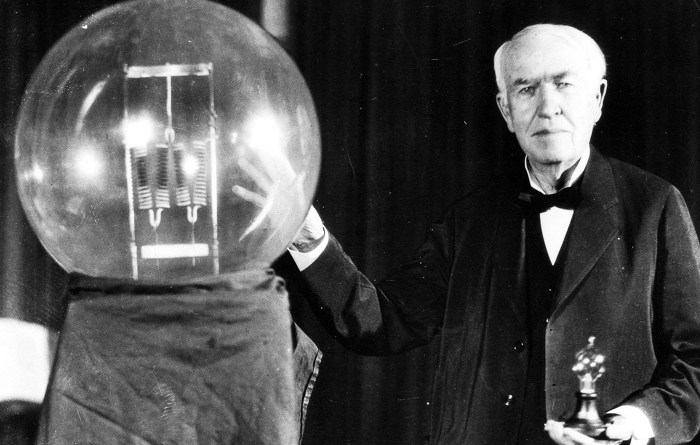On June 3, 2025, Lee Jae-myung of the Democratic Party of Korea was elected as the 21st President of South Korea. The AsiaN is publishing the hopes and expectations of Koreans for the new president and administration in both Korean and English editions. We welcome the interest, feedback, and constructive criticism of our readers.
The AsiaN Editorial Team

The saying that there is no talent in the country is just a phenomenon. The essence is that there was a lack of compensation for talent and there was no Baekrak to recognize talent. Britain led the first industrial revolution by extending the patent only to James Watt, and laid the foundation for an empire on which the sun never sets. As soon as the Civil War ended, President Lincoln established the National Academy of Sciences (NAS) in 1863, which later led to Silicon Valley and became the foundation for today’s American technological hegemony. (From the text) The photo is of the inventor Edison.
By Kim Dong-hwan
Chairman, Korea Green Food Business Cooperative
SEOUL: I sincerely congratulate President Lee Jae-myung on his election victory. In this time of fierce political competition, your election is not merely a political triumph but a signal that the era has entrusted you with the mission of building a strong and prosperous nation.
As someone who has worked in the industrial sector for over 40 years, I would like to offer a few reflections and appeals for Korea’s future, from the perspective of an entrepreneur.
Waves are visible phenomena, but the wind is their cause. The essence of a cart lies not in its shape but in its function—transport. Designing a good cart is important, but what truly matters is how effectively it performs its role. Only when we understand this essence can we develop automobiles, trains, airplanes, and ships.
The government must take full responsibility for the health of its people. As Korea ages and modernizes, the number of patients continues to rise. Increasing the number of doctors may seem like a natural response, but the core issue lies at the dinner table. The true cause of many modern health issues stems from the excessive consumption of sodium, sugar, and refined carbohydrates—what we call Red Foods.
We must shift the national focus to prevention-based health policies centered on food. A Green Food initiative promoting low-sodium, low-sugar, high-protein, and low-calorie diets is not only a solution to rising medical costs and chronic disease but a comprehensive strategy that embraces public health, medical finances, and even the well-being of future generations. This is not just a dietary reform—it is a strategic approach that positions Korea to lead the $9 trillion global food market by addressing medical issues through nutrition.
The core of the healthcare problem is not simply the regulation of Red Food, but the promotion and institutional support for Green Food.
The claim that the economy is doing poorly is a symptom. The root cause lies in our failure to invest in and support the development of new technologies. We lacked the insight to identify promising innovations, and this failure led to misguided policies. According to Nobel Laureate Robert Shiller, the driving force behind economic fluctuations is not merely monetary policy, as John Maynard Keynes argued, but technological innovation.
Throughout history, it has always been new technology that transforms humanity and reshapes industry.
When people say that the country lacks talent, that too is a surface-level phenomenon. In truth, it is our failure to reward talent and to cultivate those with the vision to recognize it. In Britain, Parliament extended a special patent for James Watt, an act that fueled the First Industrial Revolution and transformed the British Empire into a global power.
After the American Civil War, President Abraham Lincoln established the National Academy of Sciences in 1863. That institution would go on to form the foundation for Silicon Valley and the United States’ modern technological dominance.
In China, scientists are referred to as “scientific masters” (科学家)—not simply laborers in labs but respected creators. Even without a national pension system, scientists are treated as national heroes and receive special pensions. English-speaking countries likewise use titles such as FRS, NAS member, and Laureate to recognize their scientists. The way a nation names and honors its scientists reveals its philosophy toward science and innovation.
As for President Park Chung-hee, regardless of political judgments, many Koreans still remember that only 50 days after the May 16 coup, he founded the Economic Planning Board. That decision showed his grasp of the challenges of his time and his structural approach to solving them. It is for this reason that he continues to be remembered.
President Lee, I urge you to meet with inventors and scientists as soon as possible. Taking their hands and listening to their voices may become the very turning point needed to restructure our national economy.
You do not have to implement every campaign promise immediately. If you confess that some promises were made out of hope for national glory, the public will understand.
The Democratic Party stands on the foundation of equality. But for now, I ask that you momentarily set that aside and commit to rewarding excellence and innovation. That may, in fact, be the hidden philosophy you’ve long wanted to pursue.
More important than doing everything well is avoiding major missteps. Open your heart and create an era that we can proudly pass on to future generations. That would be the most profound form of inclusion—more meaningful than any apology to past critics.
Ultimately, the only policy capable of changing the destiny of our nation is one that goes beyond equality to reward talent based on justified, constructive differentiation.




